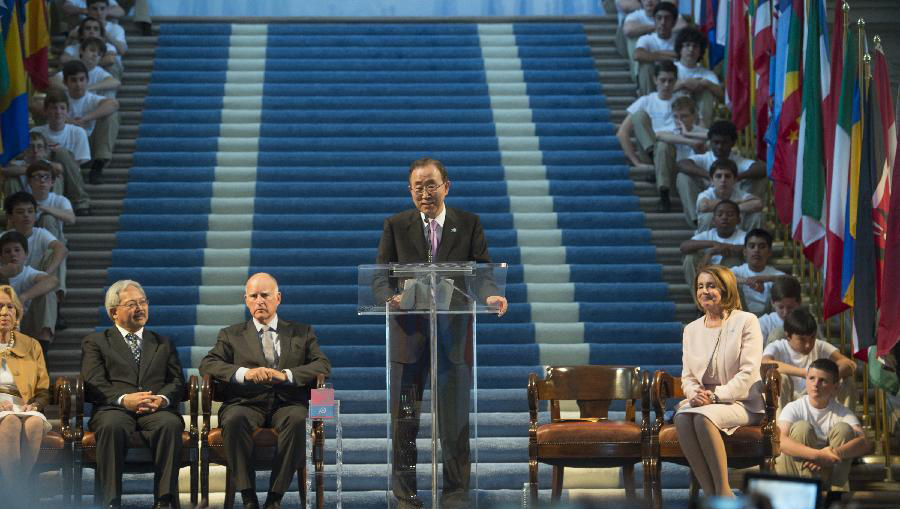UN charter lives on after 70 yrs, scholars say

On June 26, Ban Ki-moon, secretary-general of the United Nations, addresses a ceremony held in San Francisco to celebrate the 70th anniversary of the signing of the UN Charter and the establishment of the UN.
June 26 marked the 70th anniversary of the signing of the Charter of the United Nations. Chinese scholars used the occasion as an opportunity to point out that the international community should reiterate the commitments in the charter and enrich its connotation to "live together in peace with one another as good neighbors."
Born in the aftermath of World War II, the charter embodies the aspiration for every country to be free from war, fear and deprivation as well as the recognition that it is the shared responsibility of the international community to maintain peace. After 70 years, the charter is still a treasure to mankind.
Historical review needed
In February, the UN Security Council, as proposed by China, held an open debate themed "Maintaining International Peace and Security: Taking History as a Mirror and Reiterating Commitments on the Purposes and Principles of the Charter," precluding worldwide activities to commemorate the establishment of the UN and the end of World Anti-Fascist War.
"The UN would not have appeared without the victory of the Allies in the war against fascism," said Liu Nanlai, a research fellow from the Institute of International Law at the Chinese Academy of Social Sciences.
Qian Wenrong, a research fellow from the World Problem Research Center of the Xinhua News Agency, said that a series of agreements laid the foundation for the enactment of the charter, which took place at the San Francisco Conference sponsored by China, the US, the UK and the Soviet Union.
The agreements include the Declaration by the United Nations that signaled the formation of the anti-Fascist alliance, the Declaration of the Four Nations on General Security in which the nations called for the establishment of a general international organization at the earliest practicable date, the Cairo Declaration in which a military alliance against Japan was formed and the Potsdam Proclamation that facilitated the unconditional surrender of Japan. "The formulation of the charter and the establishment of the UN were the fruits of the victory in the world war on fascism."
Nonetheless, some have ignored the lessons of World War II in an attempt to reverse the verdict of war crimes and defend against the criminal charges, which goes against the basic principles of the charter. In response to this, Qian said, people around the world should remain vigilant against such words and deeds and be firmly determined to maintain the international order based on the charter and create a prosperous future with fairness, justice and lasting peace.
Contribution of China
On June 26, 1945, delegates from 50 countries signed the charter after two months of discussion. Among them, China was the first nation to sign the international treaty, known as a "textbook" for fairness and justice.
As one of the four core Allied nations, China participated in the entire process of the UN’s establishment. "For instance, China put forward many suggestions for the draft of the charter, three of which were written into the charter, namely 'Settlement of international dispute shall conform to international justice and international public law,' 'Development and amendment of international public law shall be subject to the research and advice of the General Assembly' and 'The Economic and Social Council shall focus on education and cultural cooperation,'" Qian said.
China is a founding member of the UN and a permanent member of the Security Council not because some Western powers granted it the opportunity as some stated, Qian said, but because it made significant contributions to the foundation of the UN and the enactment of the charter.
New model of international relations
China has been committed to respecting and upholding the authority of the charter. Its diplomatic concepts are in line with the purposes and principles of the charter and are a complement to the charter. Liu cited an example, saying that the Five Principles of Peaceful Coexistence China proposed with India and Burma highlights the desire of developing countries to pursue independence, self-improvement and development and reflects the anti-imperialist, anti-colonial and anti-hegemonic demands of the times while adhering to the essence of the charter.
In recent years, China put forward a concept of a new model of international relations based on cooperation and mutual benefit. Zhang Guihong, a professor from the Institute of International Studies at Fudan University, pointed out that unlike the theories that were prevalent among the international community after the end of Cold War such as "Clash of Civilizations," "Democratic Peace," "Hegemonic Stability" and "Universal Value," the China's proposed new model of international relations stresses cooperation instead of confrontation and mutual benefits rather than monopoly.
The aim is to build partnerships in politics, achieve common development in economy, realize co-construction and sharing in security, and embrace tolerance and mutual learning in culture, Zhang said, and it has further carried forward the essence of the charter.
Mao Li is a reporter at the Chinese Social Sciences Today.
